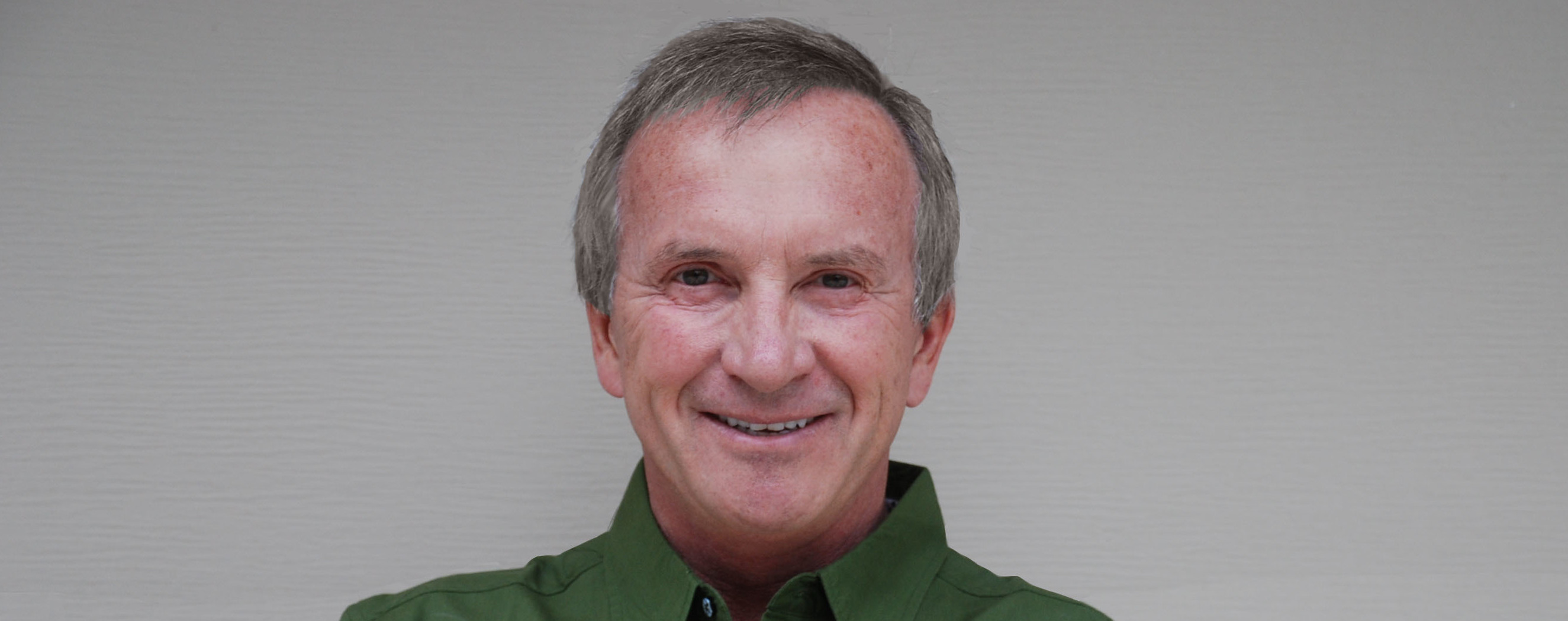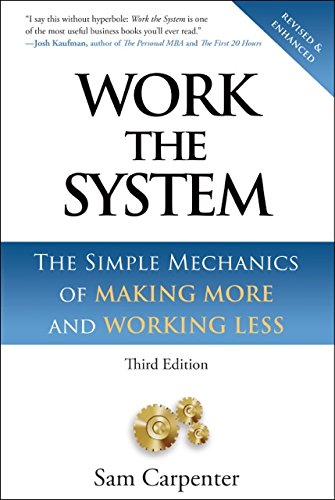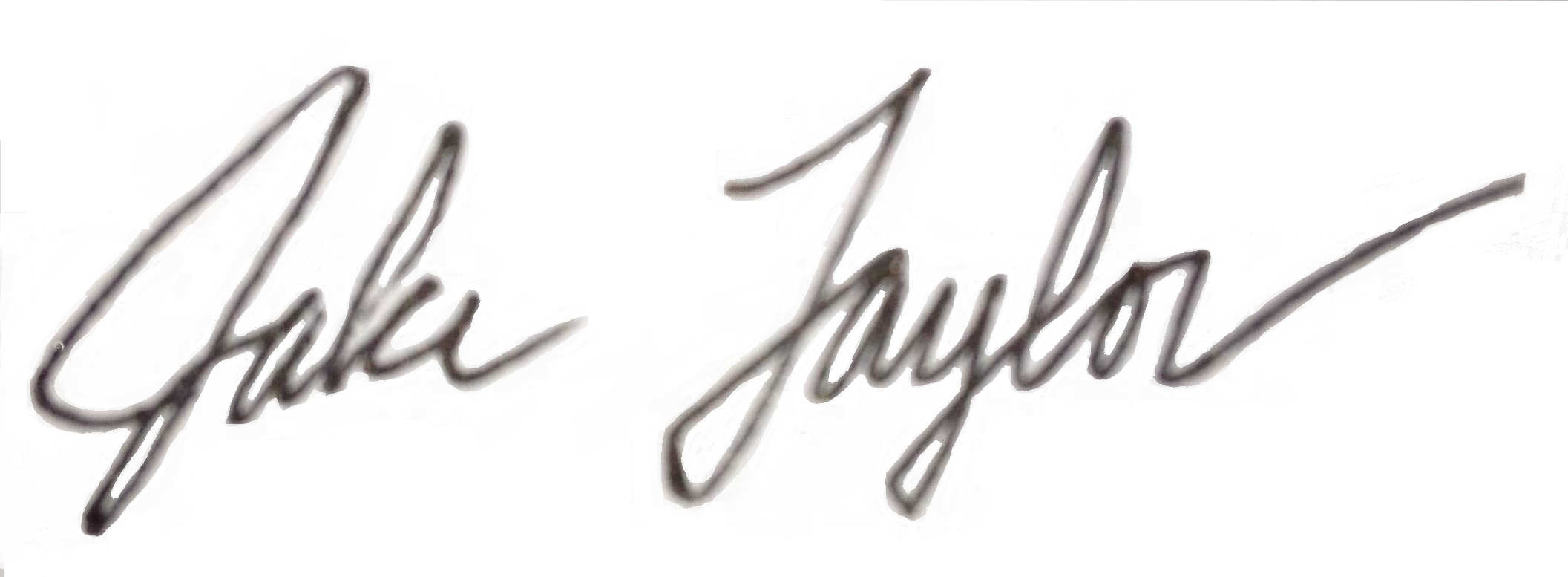[To buy the physical version, click on the book picture above. For a free PDF copy, visit here. ]
Author Background:
With a background in engineering, construction, publishing and journalism, Sam founded Centratel in 1984. He resides in Bend, Oregon, which fits with his outside interest of mountaneering, skiing, cycling, reading, and traveling. Other business enterprises include educational products, software, and consulting. Sam is founder and director of Kashmir Family Aid, a non profit aiding surviving school children of the 2005 Pakistan and Kashmir earthquake.
Sam’s Book Recommendation:
Audio Podcast:
Other ways to listen:
* On iTunes
* Right Click + Save As to download as an MP3
* Stream here directly
With gratitude,
Transcript:
Jake: Hi, welcome to Five Good Questions. I’m your host, Jake Taylor.
Our guest today is Sam Carpenter. With the background in Engineering, Construction and Journalism, Sam founded Centratel in 1984. Today we’re going to be talking to him about his book, Work the System: The Simple Mechanics of Making More and Working Less.
Sam’s other business enterprises include education products, software and consulting. Sam is the founder of Kashmir Family Aide, a nonprofit that’s helping Pakistani kids impacted by the 2005 earthquake. Let’s ask Sam five good questions.
My guest today is Sam Carpenter, author of Work the System: The Simple Mechanics of Making More and Working Less. Sam, where are we talking to you today?
Sam: Oh, I’m at Bend, Oregon, my home base. In my call center/work the system enterprise’s office.
Jake: Nice. I like that. So Sam, I’m really excited to talk to you today because I have to tell you that, a little confession time, Work the System had a huge impact on my business when I first set it up. And I was very fortunate to find your book very early on. And it gave me the gift of time because it allowed me to replicate myself in scale in a way that really I don’t think… I haven’t had as much return on investment on a book that I’ve read as I had with Work the System.
Sam: Oh, thank you. Thank you. I appreciate that, Jake. And I appreciate this opportunity to talk to you.
Jake: Oh, it’s my pleasure, trust me. So let’s jump right in to our five good questions for you. Question #1, what is a systems mindset? It’s something that’s throughout the book. And how did you develop yours? What was the back story for that?
Sam: Well, the systems mindset is encapsulates an idea of looking at the world in a different way. And so this is not about Sam’s tips to success or 5 things to avoid.
Jake: Sure.
Sam: It’s not at all about this. It starts with a very, very simple premise. And in fact the epigraph to my book; that’s the new version. If you have any other cover, any of your viewers have any other cover than that; they need to email me or get online and download the newest version.
So the systems mindset, most people go through life shuffling around whatever results they have in their lives. Everything from the shirt you have on to your relationships to your health to your business. And they’re trying to make things works, trying to make things work. And the way most people see life is as what I call, and I’ve said this a thousand times because it’s perfect, a swirling mass of sights, sounds and events. That’s how they see their life.
Jake: Yeah.
Sam: And the systems mindset goes what I call a layer deeper. We’ll talk about it in a little while. But it has to do with seeing your life, my life, the person who has this systems mindset, sees their life as a collection of very logical, independent systems. Of course, they interact. My kidneys interact with my lungs, interacts with my heart, interacts with my sole circulatory system. We know they all interact. We know a hiring process in a business interacts with the copy machine in a way. How you answer the phone at the front desk interacts with how you do a payroll, etcetera, etcetera.
But they’re independent entities that work together. And so the insight has to do with being able to… Let me illustrate it, walk down the street and see this car has nothing to do with that car. Oh they’re cars but that’s just a similarity. Same with our human bodies. My kidneys have nothing to do with your kidneys. My left foot has nothing to do with my right elbow. I could do without either one and it wouldn’t affect the other. And really, if you go through your life whether it’s relationships, business, health; this holds true.
And so with the systems mindset, you’re able to go moment to moment through the day. This is very trippy, a very metaphysical, I suppose. But it’s more real than that. It’s a very cool way to go through the day seeing the individual systems of your life. And I had an epiphany 15 years ago and in a moment of time, I got it. And I call it a mini enlightenment. And if the viewers go to the website, workthesystem.com, and look at the testimonials; you see the nature of the testimonials have to do with changing people’s lives instantly.
So once you get the systems mindset in a business environment, for instance, and I’m here at my call center looking through the window out of my operation; you look at everything in a separate from each other. All of the little entities of your life, of your business, separate entities. And then you can find dysfunction very quickly. And what you get when you get the systems mindset is that our lives are 99.9% perfect. For instance, you and I are sitting here. I’m a bundle of cells, billion and billion of cells, and every day I seem to wake up and all those cells agree with each other that I’m going to be Sam Carpenter. Not a football stadium somewhere or not a trout out in the stream.
Jake: Yeah.
Sam: I mean, I wake up every day Sam Carpenter. That is an amazing thing. And I like to say every second there are trillions of electrical signals going off right now for you and for me to be able to communicate. And all there is, is now, this moment. And so everything that’s happened in the past is gone. It doesn’t exist. This is Eckhart Tolle stuff. The Power of Now is mandatory reading if you’re a human being. The future’s conjecture, it’s not here. All we have, Jake, right now is right now.
And so every condition of our lives, if you look at the condition of your life, you see it’s full of independent processes and you see that as you analyze them. For instance, this building I’m in, the HVAC systems working. I could go to the bathroom and the water’s going to come out of the tap. I could go down and get to my car and drive off. Ninety-nine point nine percent of everything works fine.
If our lives are messed up, it’s because we have dysfunctional elements of some system or some system we don’t need at all. Or we need to create a system to bring cohesiveness together and is easily fixed. So if 99.9% of everything is working just fine, there isn’t that much to fix. I got that 15 years ago without going into the details of the story. It’s in my book. And my life has been what I’ve wanted it to be.
Jake: How has it changed your life then?
Sam: Well, I have all the money I need and all the time I need. And I do exactly what I want to do every day. I have bumps in the road. I do. But I’ll tell you if you have lots of money and lots of time, those bumps; well, those earthquakes turn into bumps. Alright?
Jake: Yeah.
Sam: And I’ve had some massive disappointments in the last couple of years and I won’t go into the details. But on a personal level, a massive loss of life of my parents, both my parents and some other stuff happened. And it wasn’t easy but I rolled through it. And Centratel continued to grow. I still have my friends, everything. So I’m more resilient and I’m more strong in the road bumps when the road bumps come and the earthquakes come. But I’ll tell you when there’s no road bumps or earthquakes, it’s wonderful. It’s wonderful to have enough time and enough money. Whatever the road bumps are, it sure helps to have that freedom. And that’s what I call freedom. Everybody has a different version of freedom. But I’ll tell you everybody would agree that part of freedom includes having a lot of time and having a lot of resources to do what you want to do with that time, right?
Jake: Yeah, exactly.
Sam: Alright.
Jake: That was what the big insight I think for me with your book was that setting up all these systems allowed me to replicate myself in a way that freed up a lot of time. That’s huge.
Sam: Well, you know what it is and I’ll just going to add this to my explanation. Every condition like the shirt I’m wearing, the books behind you, every single one of those books, the earbuds you have in, your degree or lack of degree in school, your personality; everything you have in this moment which is all there is, every condition was preceded by a process.
And so the shirt I put on this morning, well, was in the closet. We go back to the beginning of the shirt which probably was in China and work its way up to this moment in time, the most recent. If you want to break down the process was this morning I put this shirt on and made my way down here to my office and here it is we’re having this interview. This shirt didn’t appear except for the process in front of it. And I don’t care what you’re talking about, you dog, your refrigerator, your career. Whatever the condition is right now, it was preceded by a process. So it only make sense.
Let me give you a formula. And I usually do a slide but it’s easy enough to do it without it. One leads to two leads to three leads to four equals a result. And that’s your shirt, that’s your success in life, it’s your personality, whatever it is. What most people do is they concentrate on the results not even knowing there’s a process that led up to those results. I mean if you explained it in this way, they say, “Of course, that’s stupid. Of course, there’s a process that led up to every condition in my life right now.” But people don’t act on that. They don’t live their lives like that.
My staff here, I have about 40 people. And I go through every day working on systems, the book Work the System, the simple mechanics. We don’t shuffle around bad results because we don’t have any. The reason is we spend our days working on the systems, documented systems, or otherwise automate, delegate, delete. We could talk about that in a little while.
And so what this means is we are down in the basement working on the machinery that most people don’t know is down there and they’re up on the first floor of their little house shuffling around the bad results. This is critical so our viewers should pay attention. Most people are shuffling around the random bad results of unseen and therefore, unmanaged systems. The successful people of the world are managing the processes as a systems to get the desired results. That’s where they are. They’re down in the basement and working on that machinery. And most people don’t know there’s a basement with machinery there.
And I’ll just finish this up by saying I can list some people off here Oprah Winfrey, Richard Branson, Bill Gates, Steve Jobs, Ray Kroc and I could go on and on. None of these people have college degrees. And so my point here is this and this should all tie it together, we could go on with your questions. The questions will make more sense now that I’ve given this overview.
It doesn’t matter how good looking you are, what your educational degree is, what your IQ is, your charming personality, who your daddy was or even how hard you work; the machinery in the basement doesn’t care. All the machinery wants to do is fulfill its purpose.
So the machinery wants to fulfill its purpose, it doesn’t care who adjust it, what their makeup is. If you can see the machinery and you’re working on the machinery, you’ll have all the success and get what you want out of life.
So interesting none of those five people I mentioned have even a college degree. And a number of them, Bill Gates, Steve Jobs, at least not even got close to graduating college. How come if that’s such a mandatory thing? And how come we all know people who are highly educated, PhDs, that are working in a University for a 100 grand a year? I mean how come that is or a 150 but so what. That’s not money. And so they’re struggling and they’re theorizing and they’re stumbling around. And how come it is very unattractive people are wealthy and have freedom and have a gorgeous spouse or significant other? I mean why is that? That’s because they, in their guts, are working on the machinery. And if you get out, if you pin down Bill Gates or Richard Branson and put a couple of glasses of wine in them, they would agree with me 100%. I mean you just can’t explain it. It’s just in their guts. It’s a natural thing.
So what I like to see is I like to see people get the systems mindset. And whenever they have a problem come up in their lives, they’re not just fixing the problem. They’re going to the process that led up to the problem and putting something in that process so that problem never occurs again. We love errors around here. We love to see a problem because it gives us impetuous to go back because remember we’re working on our systems all day long to go back and tweak that system if it’s a recurring problem.
Jake: Yeah.
Sam: And it usually means documentation in a business. Boring but true. Not so much in personal relationship or in health.
Jake: Yeah.
Sam: And that’s the overview of the systems mindset. And I came to it in a midnight epiphany. I had been on any depressants, I have been working 80 to 100 hours a week for 15 years, a decade and a half. And I was basket case. I was about to lose my business because I wasn’t going to be able to make a payroll. And it came to me in a flash and I never went back. I made that payroll and I’ve been building the business ever since. And this business, this call center business that I’m in; it’s an answering service. We handle medical emergencies and so forth with live human beings. It’s a business that’s right for error. We’re the best in the country by any number of metrics. And the reason is because we do nothing but work on the systems and take feedback from the people on the bottom lines and act on it right away, very quickly. And that’s what it’s about.
And if you go to my website, www.workthesystem.com, if our viewers go there; go to the FAQs and there are some explanations in there and all of these should tie together even better. Okay.
Jake: Great. Yeah.
Sam: Yeah.
Jake: So how about let’s transition a little bit in talking about the book. So question #3. It came out in 2008, have there been any updates or epiphanies that you’ve wished could’ve been in that edition or maybe some success stories that have come out since the book came out that you’d love to share?
Sam: Well I know Jake, you and I share something and that is a love for reading.
Jake: Right.
Sam: And I think most of the viewers here share our love for reading. And I think most of the viewers out there understand that when you sell a manuscript to a publisher, you don’t have any ability to tweak it. Alright?
And it’s great. They send you the 30,000 upfront or whatever and they put the book out there. But if the book doesn’t sell in 90 days in the bookstore, it’s gone. I mean you might as well just think about another book because you’re not going to go back and be able to change it.
I have a real publisher, Greenleaf Book Group, hard cover, always hard cover. This is the ninth printing of the book, the 3rd edition. And I spent a lot of money to retain ownership of the manuscript. So from the 1st edition, in fact, in this and our viewers could download the whole book either pdf or audio at my website, workthesystem.com.
The preface to the 3rd edition talks about the whole episode that has lasted six years of getting this book to be what I want it to be and through nine printings. Every single printing I made tweaks in the book. This last one if you can believe it ninth printing, I made 2000 changes to this book to make it better and better and better. The message has not changed. From the 1st edition to the 2nd edition, we switched some chapters around. But the chapters have stayed the same. Some of the headings were changed even in this most recent edition. Two thousand grammatical sentence structure, a little bit of extra information but the message is sounded. It hasn’t been changed, it just reads better.
Jake: So you’re working the system of your own book then?
Sam: Exactly. And I talk about it and it puts together the quite lengthy 3rd edition preface. So anyway, there is an explanation for you.
Jake: That’s great. So question #4. I can imagine that there are a lot of small business people out there that they’re very busy, obviously. I mean, think about yourself 20 years ago drowning in your business. And why should they spend the time to read Work the System? Like obviously, they’re very busy. Like what’s going to be their return on their time and investment of reading it. Why is it so critical for them?
Sam: Well, once you get the system mindset, you’ll go there naturally of sitting down and working up processes. Boring but true, it does take documentation in a business. But you got to get your head in this place where you realize all the results you have in the future will be based on the systems you work on today.
So what happens, so let me illustrate what happen here very quickly. But I have this process that was very dysfunctional. That midnight epiphany was followed by my day in the office where I took my two managers up and I said, “What is the biggest problem in this office?” And I have this different way of looking at my business all of a sudden. Separate elements. And we decided what it was. And this particular process, I talk about it in the book at length. But it was taking me two hours a week and each of my two managers at the time two hours a week to perform. Well, my two hours a week had been going on for 15 years. That’s almost a year of, you do the math; it’s almost a year of 40 hour work weeks.
We work on this process. It took me, personally, 8 hours to work on this process with my two managers. We put our heads together and made this process perfect. Put it on paper so anybody could do it. And I found myself a week later handing that process off to just another person in my office and the lady said, “What do you want me to do with this?” I said, “Just do it.” She said, “Well, you got to give me instructions.” “I just gave it to you.”
So I didn’t even have to train her. And I’ve never done this process again for 15 years. Interestingly enough, I had 15 years of nightmare. And herein that right now is another 15 years of success. The business will have had 30 years December 1st. For the last 15 years, I just saved almost a year in 40 hour work weeks with that one process.
So now I’m down from 100 hours a week to 98 and the rest is one system after another to the point where I work two hours a week now. And I make my income as something like thirty times as much. I make a huge profit in this business. It’s not only the best, it’s the most profitable. And my people are the highest paid anywhere. This is what will happen to anybody who takes this viewpoint of working on the processes. It’s about efficiency. It’s about making things work smoothly. Here are the three words. If our viewers are writing anything down at all, every decision you make as a leader should be checked out with these three words: Automate, Delegate or Delete. Automate, delegate or delete.
So we had a number of systems in my business that we deleted, some processes. And my business partner Josh Fonger, business partner in my consulting work, we have quite a good little consulting coaching business. We handle hundreds of accounts up to a half billion dollars in annual revenues. And this is all we do. Josh and I can walk in a business in 20 minutes and tell you exactly what needs to be done.
Jake: Or not done.
Sam: Because we understand… Or not done, right. Yeah, in it sense of what needs to be done. Eliminate this. Eliminate this whole department. So we can walk in the business because we see things in this way and it’s very clear. And you know really we need to stay in the business for a few hours maybe. But I’ll tell you with our coaching accounts that in 20 minutes of a conversation on the phone, we know exactly what’s wrong. And a lot of coaching accounts, of course, have read the book and they know what’s wrong too. Help me get to that place because, of course, the problem is this. So we get this insight, “Love my book, okay, start doing it.” “No, I’m too busy.”
Jake: Yeah, yeah.
Sam: Right. So the point is you find the time to start. And as I illustrated, I was working 100 hours a week when we did this first process. When I saw I saved two hours a week, I was excited. And I put away some of the fire killing, do the fire killing and I worked on processes. And it didn’t take me long to get my people to write the processes. So I’m not writing down, first we do this, second we do that. We even got software to make that part easier.
So what will happen is there’s this what we call heavy lifting at the beginning. But a real leader is going to do these things. Because if small business, if somebody’s working 60 hours a week and they’re trying to build their business; well, how are you going to do if you’re doing twice the business? Let’s say you’re successful and you’ve doubled your business, you’re really going to work on 120 hours a week. It’s not humanly possible, 110 is but not 120. I know. I know.
And so you’ve got to be spending some time in this disciplined adult place of working on your processes so you’re getting the results that you want. And you’re not shuffling around these bad results, these random bad results of unmanaged systems. You’ve got to manage your systems. Work the system. That’s what it’s about.
Jake: Yeah. So okay our last question here, question #5. And this is maybe a little bit more for people who’ve already read the book or at least appreciate a systems mindset. And maybe they’re in a fast moving environment. Let’s say they’re a startup environment. Do you feel that Work the Systems mindset can also be applicable for a business when it’s rapidly changing? So you have all these procedures, right, of how to implement your business successfully. Is there any concern that they’d be too brittle, let’s say, like you’re always having to be updating your procedures and you actually get any work done because things are moving so quickly?
Sam: Okay, that’s a very interesting question and I get it all the time. And the answer is very simple. Eighty percent of what we do and even creative businesses has to do with marketing or maybe you are a marketing business but you got to market your marketing business. You’ve got to do the books. You’ve got to make the payroll if you have employees. You’ve got to have a place. You’ve got to have a phone line. You got to pay the bills. You’ve got all these things that are 80% of your business.
So what we find ourselves doing as entrepreneurs is spending so much time in these areas instead of you, for instance, prime time for you is talking to me right now. You’re in prime time, Jake. But I’ll bet you spend a lot of time doing shuffling around and making appointments with people like me or maybe you have to do that. But there’s so much of your business that is mundane and routine.
I had a copywriter come to me and say, “I’m a copywriter. It’s totally, totally, it has to do with my spiritual feeling or my creative instinct. And it’s a totally creative job.” And I said. “No, it isn’t.” “Well, yeah.” And he had read my book. He liked my book. He just didn’t know how to apply it. And I said, “Just break your typical copywriting job down into the elements.” Well, there were 18 elements. Everything from taking the call from the potential client to delivering the product, 18. Seventeen of those steps could be done by somebody else. So he took a 40 hour copywriting job and put it down to four hours because he has this assistant interviewing a client and doing all these research. I don’t care how, you know, people get caught up to this heroic thing about how clever they are. And they are. And that’s what will probably make them successful. But what if you could do that ten times more than you do it now?
Jake: Yeah.
Sam: That’s the point. So let’s take the mechanical stuff, automate it, delegate it, delete it so you can be you. And you are at your prime right now talking to me. And I’m at my prime right now actually talking to you. These are the things we do best. What if we could do this all the time or ten times more?
Jake: Another thing I found too is that not only my time but also my mental energy. Like it freed me up to think about the bigger picture of things instead of being bogged down in the minutia.
Sam: Exactly. So our brains do have a certain amount of capacity. I’d get up at 4 in the morning, that’s my prime time till about noon. At one o’clock, I’d fall off the cliff and they throw me out of the office. I’m just a nuisance. You have 6 to 8 hours of prime time. Now you’re much younger than me so you’ve got longer. But I’ve got 6 or 8 hours of prime time and I relish it. I get jealous over and I will not be interrupted. Those are the moments I do this kind of thing or I write or I work on sensitive issues with a big client or whatever. But the afternoon, I’m useless. You know what I do? I go home and I rake the yard. I do meditative, athletic, social things in the late afternoon and the evening. But that six hours in the morning, I’m hammering.
You’re right, if you get burned out on the mundane stuff and you can’t even get to the creative till the end of the day; well, tell me how’s that going to go in the long term. And prime time for a leader is working especially at first on the processes. Working the systems so the creative element is freed both in the scope of not bugging your mind down with the mundane to having the time do what you want to do.
Jake: Yup, great. So we always ask this bonus question because, obviously, we’re big on reading around here.
Sam: Yeah.
Jake: And we’re looking for a book recommendation. And this would be something that either you feel hasn’t got the attention it deserves or that you feel like it’s made a big impact on you. So what’s the book and then why should we read it?
Sam: Okay, I’ll give you the book but I want to give you a couple of other authors in addition. Okay?
Jake: Okay, alright.
Sam: The book is Harry Browne: How I Found Freedom in an Unfree World. And it was published in 1973 and updated in 1996. And Harry Browne is deceased now. That is mandatory reading if you’re a human being. Okay?
Jake: And that’s probably most of our audience.
Sam: I hope so. And the other one is… I only get two, huh? Let me look at my list and I have to sort through here. Okay. Anything by Tony Robbins. And let me see who else here. I’ve got like 12 here for you. Okay, here is one a later book, The Shallows by Nicholas Carr. And that’s I think two years old and it talks about our reduced attention spans.
Let’s face it, the smart phones, a better term a “ringer off”. The smart phones make our attention spans shorter. And we’ve all seen everybody in the restaurant doing this. And the way TV is and the way media is, the way computers are; it’s hard to focus. And Nicholas Carr encapsulates that beautifully. And quickly, the solution to that is reading. A book. Not a magazine and not a newspaper and not a kindle but a book.
Jake: Yes.
Sam: Right? So there you go. Tim Ferriss is terrific too. Tim Ferriss is putting out so much good content. He’s got a number of books but his online presence is incredible. You and I talked about that before.
Jake: Yeah.
Sam: And Ramit Sethi, a terrific, terrific stuff in the financial area. I know you wanted one but I gave you five or six.
Jake: Well, that’s the extra bonus in for everybody.
Sam: Alright.
Jake: Alright. Well Sam, we really appreciate you coming on the show. It’s been fantastic.
Sam: Thank you, Jake. I appreciate it.
Jake: Alright.
Sam: See you.
Jake: Bye.





